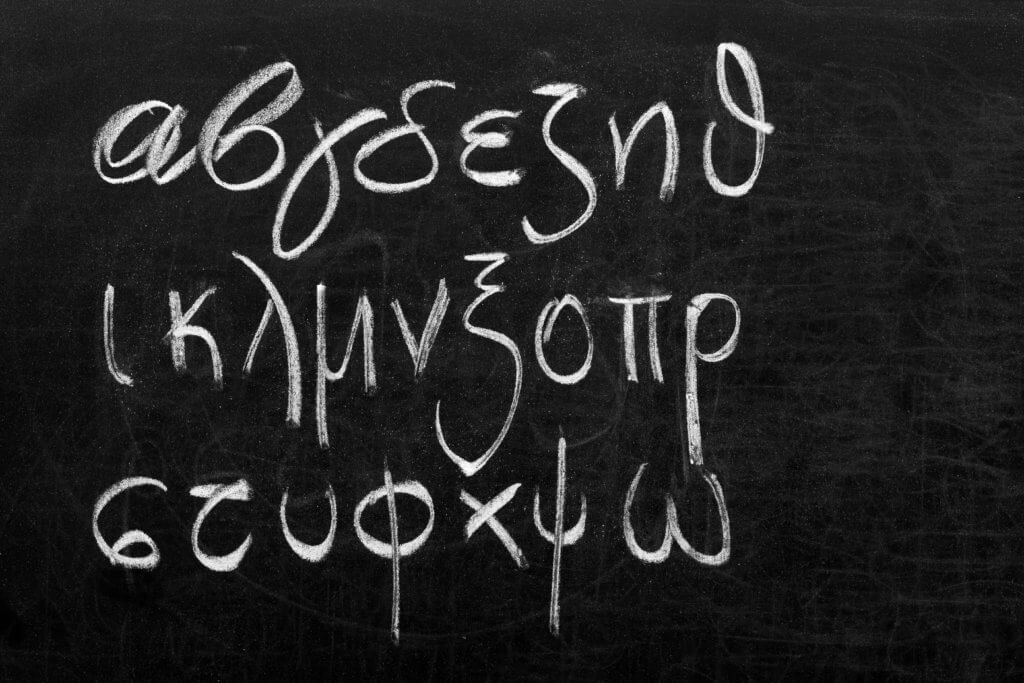How to Learn the Greek Alphabet (In Just 2 Weeks!)

Before traveling to Greece for the first time, I made a commitment to myself to learn the Greek alphabet. I made the decision late, and only had two weeks to learn – but I did it! As this alphabet has some similarities to our own, this is definitely doable for anyone who has the goal of learning the Greek alphabet fast.
In this post I’ll teach out how to learn the Greek alphabet in 2 weeks, by providing a lesson plan for you to follow. Additionally, you’ll also find a list of the top Greek phrases for travelers as well. Both will be helpful as you travel Greece, particularly the less touristy areas where less English is spoken.
Greek Language Overview
Greek, known as Elliniká my native speakers, is the longest-documented living Indo-European language today. The language is believed to have been spoken for at least since the 3rd Millenium B.C. It was once the Lingua Franca of the Meditteranean world, with speakers throughout the eastern Mediterrean to as far east as India. This version of the language was known as Koine Greek and was spread through the conquests of Alexander the Great.
Koine Greek grew to become an important 2nd language throughout the Roman Empire in later times and was also the language used by the apostles to spread Christianity. It is therefore the original language of the New Testament in the Bible.
RELATED: Spanish for Travel
Today, Greek is mainly spoken in just Greece, Cyprus, and Albania, but the impact of the language can be seen in our own today. About 5% of our English words are borrowed from Greek – many of these are related to the sciences. For example the suffix “ology” comes from the Greek logia, which means “the study of__”. Other words derived from Greek include xylophone, bishop, papyrus, and oil – to name just a few! You can learn more about the Greek language here!
What are the 24 Greek Letters?
The letters, their names, and associated pronunciation for each are listed in the table below:
| Letter | Name | Sound |
| Α α | alpha | Long “a” like water |
| Β β– | beta | “v” like very |
| Γ γ | gamma | Soft “g” sounds or “y” sound like yawn |
| Δ δ | delta | “th” like there |
| Ε ε | epsilon | “e” like met |
| Ζ ζ | zeta | “z” like zen |
| Η η | eta | “i” like in machine |
| Θ θ | theta | “th” like there |
| Ι ι | iota | Ι“i” like in machine |
| Κ κ | kappa | “k” like in king |
| Λ λ | lamda | “l” like lake |
| Μ μ | mu | “m” like many |
| Ν ν | nu | “n” like nest |
| Ξ ξ | xi | “x” like rex |
| Ο ο | omicron | “o” like soft |
| Π π | pi | “p” like pen |
| Ρ ρ | rho | “r” like rojo in Spanish (trilled r) |
| Σ σ/ς | sigma | “s” like system or “z” like museum |
| Τ τ | tau | “t” like tyrant |
| Υ υ | upsilon | “i” like machine |
| Φ φ | phi | “f” like philanthropist |
| Χ χ | chi | “ch” like Scottish loch or German ich |
| Ψ ψ | psi | “ps” as in lapse |
| Ω ω | omega | “o” like soft |
A Few Tips for Learning the Greek Letters
Here are a few tips that helped me as I studied the Greek alphabet:
- What makes the Greek alphabet easier to learn than any other writing system (for those who use the Latin alphabet), is that many of the letters are very familiar. Take a look at the alpha, beta, or omicron letters, for example. In fact, the very word “alphabet” is derived from the names of the first two letters in this Greek version.
- If not part of the Latin alphabet, many other letters are probably familiar to you because of college Greek life. Take the delta sigma theta sorority, or the alpha phi alpha fraternity, for example.
- These are some false cognates in terms of pronunciation – watch our for them! The letters below had me the most tripped up:
- η – The lowercase “eta” looks very similar to our lowercase “n”
- ν – The lowercase “nu” is exactly like our lowercase “V”
- Ρ ρ – While the letter “rho” looks like our “P” it is actually more equivalent to “R”
- υ – The lowercase “upsilon” looks like our “U”, but is actually equivalent to our “i”
- You’ll note that the letter sigma has three representations. The uppercase, and two lowercase versions. You use the first lowercase symbol σ within a word and the second lowercase symbol ς at the end of the word.
- Don’t get caught up in comparing the order of our alphabet with the Greek one. For example zeta (like our zee) is not at the end of the alphabet. That position is instead held by omega.
- Finally, there are several letters that have the same sound, which should simplify things a bit:
- omicron and omega both make “o” sounds
- eta, iota, and upsilon all make an “i” sound
- delta and theta have a similar “th” sound, although the “th” in delta is a bit softer
The 2-Week Greek Alphabet Lesson Plan
Learning anything takes repetition and practice – there is no way that what you learn will stick if you don’t keep these principles in mind. And this is exactly what I based this two-week learning plan on: practice, practice, practice!
I recommend setting aside at least 10-30 minutes each day on this effort. If you do that and follow the plan below, you will have no problem learning the alphabet in two weeks.
Day 1-2
When you are first getting started, I recommend spending time each day just writing out the letters and practicing the associated sounds. This will keep you used to the way that the symbols look and how they relate to the sounds you pronounce every day.
Day 3-10
Starting on your third day, it’s a good idea to start tying the letters to actual Greek words. The goal here is not to memorize all the words, but to sound out the words as you write. You can use google to find representative words (or just use the words from the list in the next section), and practice one word that starts with the letter of the alphabet that you intent to learn. Don’t try to do every letter of the alphabet at once, instead, try using a schedule like the example one below:
Day 3:
Α α – alpha – Long “a” like water
Β β – beta – “v” like very
Γ γ – gamma – Soft “g” sounds or “y” sound like yawn
Day 4:
Δ δ – delta – “th” like there
Ε ε – epsilon – “e” like met
Ζ ζ – zeta – “z” like zen
Day 5:
Η η – eta – “i” like in machine
Θ θ – theta – “th” like there
Ι ι – iota – “i” like in machine
You can speed this up/slow it down as much as you like, but your goal is to work through the whole alphabet in 8 days. As an add-on, start using the Duolingo app daily to practice reading out words in Greek.
Day 11-14
Your last four days should be spent quizzing yourself. Test yourself daily on what you’ve learned so far, and notice what your weak areas are.
- Which letters do you forget the most?
- Are there sounds that you struggle with?
- Can you remember the names of each of the letters?
To help you test yourself, check out the resource below:
The Greek Alphabet Quiz Worksheet
The Greek Alphabet Quiz Worksheet comes complete with a Greek to English quiz and an English to Greek quiz. In addition, there are flash cards that you can print and cut out for practice as well. This worksheet and be used over and over again – you can practice the alphabet until you get it perfect!
Download the worksheet below:
Learn the Greek Alphabet Song
As mentioned above, a great way to learn the Greek Alphabet is by singing it! That’s how we learning the English alphabet, right? While the song provided in the video below is not an official alphabet song, it will be a great help as you practice learning the alphabet. Check it out!
Bonus: Greek Phrases for Travelers
To help you as you learn the alphabet, it only makes sense to provide common Greek Phrases for Travelers. Learning these will help the alphabet stick with you longer. It will also help you navigate through Greece a bit more easily. At the very least, you’ll earn a few brownie points from the locals :).
RELATED: Thai for Travel
Greek Greetings
Say hi/goodbye to everyone you meet:
- Hello/Goodbye (to multiple people) – Γεια σου (Ya soo)
- Hello/Goodbye (to one person) – Γεια σας (Ya sas)
- See you! – Τα λέμε! (Ta léme!)
- Good Morning – Καλημέρα (Kalimera)
- Good Afternoon – Καλησπέρα (Kalispera)
- Good Night – Καληνύχτα (Kaliníhta)
- What is your name? – Πως σε λένε? (pos oh lehneh)
- My name is… – Με λένε (may leneh)…
- Pleased to meet you – Χάρηκα (Hárika)
- Hello, are you well? – Γεια σας, είστε καλά (ya sas, iste kalaa)
- I’m very well, thanks. And you? – (Είμαι) μια χαρά, εσείς (emay) mia charaa, esis
- Okay / So-so – Έτσι κι έτσι (etsi key etsi)
- Goodbye – Αντίο (Adio!)
Note: Good morning is one phrase that you should be sure to get down, no matter which country you are visiting!
Other Essential Greek Phrases
Other words you may need on a daily basis:
- Yes – Ναι (Ne)
- No – Óχι (OH-hee)
- Thank you – Ευχαριστώ (efharisto)
- You’re welcome – Παρακαλώ (Parakaló)
- Excuse me/Sorry – Συγνώμη (Signomi)
- Do you speak English? – Μιλάτε αγγλικά (Milate aglika)
- I don’t speak Greek – Δεν μιλώ ελληνικά (Den milo ellinika)
- I don’t understand – Δεν καταλαβαίνω (Then kahtalah vehnoh)
- Please – Παρακαλώ (Parakaló)
- Where is the bathroom? – Πού είναι η τουαλέτα (Poee enay ee tualetah)
- How much is it? – Πόσο κάνει αυτό (Pohsoh Kahne afto)
- Help! – Βοήθεια (vohitheia)
Frequently Asked Questions About Learning Greek
Learning the Greek alphabet is considered manageable for most people, especially if you have experience with other writing systems. There are 24 letters to learn, each with an uppercase and lowercase form. Having a systematic approach can aid in learning.
To memorize the Greek alphabet easily, you may want to use mnemonic devices, flashcards, or associate the letters with pictures or sounds that are familiar to you. Practicing regularly and writing them out can further reinforce your memory. Apps and online resources specifically designed for learning the Greek alphabet may also be helpful.
To learn to write the Greek alphabet, begin by studying the shapes and strokes of each letter, both uppercase and lowercase. Practice writing them repeatedly by hand, following proper stroke order and using reference materials or guides. Additionally, watching videos or working with a native speaker can help you to understand the nuances of handwriting in Greek.
Final Tips to Learn the Greek Alphabet Fast
In summary, use the following tips, detailed in this post, to help you learn the Greek Alphabet quickly:
- Practice writing the Greek alphabet daily
- Sing the Greek alphabet song – there is a reason why we used one when learning the English alphabet – it sticks!
- Practice spelling out words in Greek
- Quiz yourself! – Use the resources provided in this post to help you as you study
- Practice learning a few basic words – The list above will get you started on this!
RELATED: Italian Phrases for Travel

Additional Resources for Learning the Greek Alphabet
There are a few learning language resources that I use on a regular basis, and highly recommend:
- Duolingo – This app is great for getting you to practice with the Greek alphabet right away! I recommend starting with the app after spending at least a few days writing out the Greek letters first.
- italki – Use this site to practice your speaking skills with native speakers. You can speak with other language learners, like yourself, for free! Or spend as little as $5 for a lesson with a tutor or certified teacher.
Happy language learning!


Thanks for the tips! I moved to Cyprus not long ago, and Greek is definitely not my first language.
Keep posting, this was great!
You are most welcome, thomas!